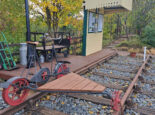Cheers for Peterborough volunteers!

Once regarded as an activity mainly for those outside the world of work with a bit of time on their hands, volunteering is becoming increasingly recognised and valued – not only by those eager to give back and gain experience, but by employers and universities too. The Moment talked to Liz Telford, Volunteer Centre Co-ordinator at Peterborough Council for Voluntary Service
How do you help charities and those who wish to volunteer for them?
Peterborough Council for Voluntary Service was set up over 30 years ago to help local communities and charitable organisations by giving advice on setting up – how to fill in forms for grants, for example. Within that we also cover volunteering. People who want to volunteer come to us and we try to match them up with a volunteering role that we have on our system here, all of which have been sent to us by organisations that require volunteers.
So, a little like a Jobcentre for volunteering?
In a way, yes – but there’s no pressure. You get a lot of people who say ‘I don’t know what I want to do…’ which is fair enough! It’s part of my job to chat to them, find out a bit more and then suggest different roles that I think would interest them. We give them printouts of all the different roles that we’ve talked about, and then it’s up to the individual whether they contact the organisations.
What kinds of people come to you? Is it pretty broad?
It’s very broad! Anybody from 16-year-olds to those in their 80s. Maybe they’re retired and want to find something new, or they’ve got a lot of skills and experiences – perhaps they’ve been in admin or IT and want to use that in volunteering. We have some people that come to us who maybe have had a mental illness, and they find getting up in the morning difficult. Well, if you’re volunteering somewhere then it provides motivation, knowing you have to be at a certain place at a certain time because you have committed to doing that. Also for people who have simply been out of work for a long time and got out of the habit of doing that. Some do it simply because they want to give back to the community. Perhaps they have a relative who lived in sheltered housing, for example, and want to give something back, so volunteer there.
There’s another advantage for people who are looking for jobs or for a change in career. If they go to organisations such as RNIB or the hospital, for example, who do also have paid staff, it means they are there if a paid role comes up. We have had people volunteering who were then taken on as paid staff, so that can happen – being there as a volunteer means you’re on the spot, plus they know you, and you know the job, so there is a good chance of you being offered a job if you wanted to go down that route.
Has volunteering changed in those 30 years? It seems much more embedded into the world of work these days…
It is, and Jobcentres use us a lot more now, because they have realised that people have got skills but are not always using them. For keeping those skills up to date volunteering is a good way to go – or you can learn whole new skills. It also shows that you are committed to an organisation and looks really good on a CV. Also, now, if young people want to go to university or college they are expected to have done a certain amount of volunteering. That goes on their application form. It doesn’t have to relate directly to the subject they are going to study at university, just as long as they have done something – because it shows that they are committed.
Is one of the key attractions the flexibility – the fact that you can still volunteer even if you could only offer, say one afternoon a week?
That’s absolutely fine – and the charity would be very grateful for that because they would know that for that one afternoon a week you’d be coming in and taking the pressure off them.
And do you have any people in full-time or part-time paid work who also volunteer just because they want to?
Yes! I actually do that myself. Every year between September and March I go to a charity for the homeless once a week in the evening – serve a meal, chat to the homeless people… I’m on a couple of other committees for community-based organisations as well, and I’m not the only one doing that. Our deputy CEO is also a trustee for an organisation called Froglife, so yes, lots of people do it!
Are some of your volunteers highly qualified?
We have one organisation that takes young people who have been excluded from all schools in Peterborough. They’ve started a school where they go and do basic maths, English and so on, but they also teach practical skills – car maintenance, painting and decorating, bricklaying and so on – so they have some skills when they come to look for a job. And they use volunteers who have been teachers, who have had their own building and decorating companies, many highly skilled professionals who have faced redundancy or are looking to try a complete change of career. Our volunteers come from an array of diverse backgrounds and communities.
And what you do is purely for charities and non-profit organisations?
We do have commercial organisations coming to us, but only to help them fulfil their corporate social responsibility. So, they may phone up and say they have a group of employees who want to have a volunteering day, and have we got any organisations who need a group of people to help out – doing gardening, decorating, moving furniture and so on. That’s the only time we deal directly with commercial companies. We wouldn’t ever send a volunteer to one, for example.
What general advice would you give someone who was thinking of volunteering?
Have a look at what’s available on the Do-It website. Also, we have an appointment system here three mornings a week – half hour appointments with me or my colleague. You come in, fill in a simple enquiry form outlining areas and activities you’re interested in and we then sit down and go through that with you. So, for somebody interested in volunteering with older people we would give them information on the Salvation Army and the befriending service that they provide. In National Volunteers Week we also try to have a volunteers fair – normally the first week in June – where we get other organisations and go either to Queensgate or Tescos at Hampton and hand out leaflets. It’s a chance for people to chat directly to the various organisations about volunteering and what opportunities they have.
Are the chances of you getting something you want quite high?
Yes, they are! On our computers here we have over 500 volunteering roles within the Peterborough area, and there are always more roles available than there are people to fill them. We get new volunteering opportunities every week.
Tell us about your Volunteer Awards Night…
We want people to make the most of their volunteers, and also let them know that they are appreciated. So, each year we set a date, then send out a nomination form to all the organisations we have on our database. They can nominate one person per organisation. They fill out a form, send it to us, and then we invite that person, plus a guest, plus somebody from the organisation to the awards evening. We try to make that a really nice evening for everyone to attend. We read out what the organisation says about these people, how they appreciate them – because some people go far beyond what is asked of them – and then award them a certificate, and follow with a buffet so everyone can sit and chat. It’s a lovely evening.
Many of them are people who would never meet up together, but it gives them a chance to chat and network, listen to other people’s stories and experiences – and if you’re having a problem within your organisation you can swap ideas. The next one is July 2017, and all you have to do to get an invitation to take part is for your organisation to be registered with us.
Volunteer case study #1
The Salvation Army Good Neighbours Scheme
Being lonely is one of the worst things an older person can experience. For most of us, having friends to talk to and share experiences with is often taken for granted. The Good Neighbours Scheme offers support with volunteers visiting the elderly ‘service users’ in their own homes, befriending, providing companionship and helping to bring a bit of the outside world into their homes. To constantly meet this demand volunteers are urgently needed. The Salvation Army’s Volunteers Development Officer, Colin Wise says: ‘We can never have enough befriending volunteers – so perhaps you can help? All it takes is an hour of your time each week to visit an older person in their home for a cup of tea and a chat. Positive mental wellbeing encourages physical wellbeing, all of which can stem from this simple visit. Volunteers often say to me “What we are doing isn’t complicated or profound. It’s just the little things that make such a difference to people’s lives.” We offer all volunteers training, on-going support, the opportunity to become part of an enthusiastic team and a role in making a difference to the community. ‘If you are 18 or over, committed to the well-being of older people and able to spare an hour or two (daytime or evening) each week, we’d love to hear from you. Volunteers do not need to have any formal qualifications or previous experience.’
Contact: Colin Wise – Volunteers Development Officer The Salvation Army 1203 Bourges Boulevard, Peterborough E: T: 01733 892013
Volunteer case study #2
Guide Dogs for the Blind
‘The work that we do at Guide Dogs is possible due to the fantastic support of more than 16,000 volunteers across the UK. We simply couldn’t survive without their commitment and creativity.’ In 2015, Guide Dogs for the Blind volunteers gave more than 19 million hours to help more people with sight loss get out and about and live life the way they choose, and more than 1,840 people were able to do so because of the regular support of a My Guide volunteer. Between July 2015 and June 2016 more than 8,000 volunteers supported the guide dog training programme, and in 2015 ensured that around 1,050 puppies successfully went on to early training. Other volunteering opportunities include fundraising, Community Sighted Guides to help people who are visually impaired to navigate their environment, speakers to tell the stories about Guide Dogs to schools and clubs, drivers to transport our puppies, dogs, people and equipment. In fact, there are over 50 different ways that you can give your time to Guide Dogs!
To find out more about volunteering for Guide Dogs, visit: www.guidedogs.org.uk/volunteer E: T: 0845 371 7771
Peterborough Volunteer Centre
Appointments are held three mornings a week, from 10-12. Here you can talk to an adviser and look at the many and varied opportunities that are available. Charities and non-profit making organisations advertise their volunteering roles with the Volunteer Centre, which also advertises on its website, in the monthly magazine MEMO and on www.Do-it.org
Peterborough Council for Voluntary Service
This group also runs a Community Development Project where anyone can come for guidance about setting up a charity, non-profit or community organisation. Volunteer Centre Opening times Monday to Friday Telephone service only between 9am-4pm or email to request more information. Tuesday Every Tuesday we offer half hour appointments between 9.30am and 12.30pm. All discussions are confidential and take place in a private room, with no pressure for on-the-spot decisions. Contact: Liz Telford – Volunteer Centre Co-ordinator
E: T: 01733 311016
www.pcvs.co.uk
This feature been supported by Peterborough-based Perkins Engines Company Limited, one of the world’s leading suppliers of off-highway diesel and gas engines.















